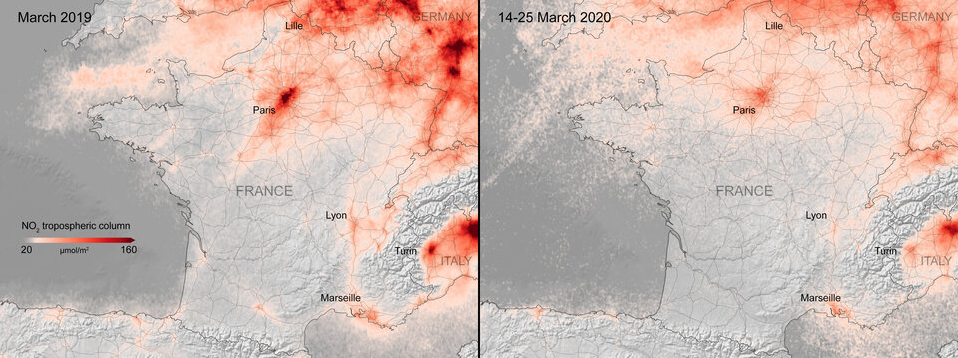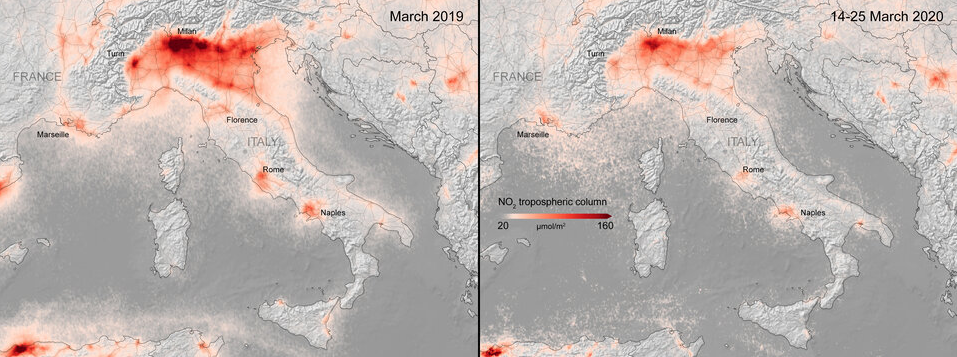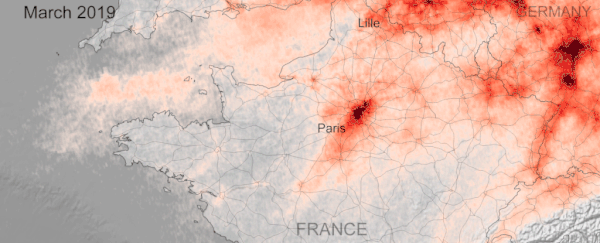The pandemic caused by the novel coronavirus is creating all kinds of chaos for human society. But for the dear old Earth, and the humans and creatures that breathe its air, it's a bit of a reprieve.
Mirroring what happened in China during lock-down, Europe is now seeing the same drop in air pollution.
This data comes from the ESA, and their Copernicus Sentinel-5P satellite. It shows nitrogen dioxide (NO2) emissions over France in March 2019 in one frame, and between March 14th to the 25th on the next frame. Dense red indicates higher emissions of NO2.
Scientists from the Royal Netherlands Meteorological Institute (KNMI) are using the satellite to monitor both weather and pollution over Europe. It's not only Paris that shows a large drop, it's also cities like Milan and Madrid.
The team of scientists used data spanning 10 days in 2020. Henk Eskes is one of the scientists from KNMI. In a press release, he explained why these dates were chosen.
"The nitrogen dioxide concentrations vary from day to day due to changes in the weather. Conclusions cannot be drawn based on just one day of data alone. By combining data for a specific period of time, 10 days in this case, the meteorological variability partly averages out and we begin to see the impact of changes due to human activity."
Some NO2 is produced by natural processes like bacterial respiration, lightning, and even volcanoes. But the bulk of it is produced by us: mostly the burning of fossil fuels in internal combustion engines.
But with the restrictions on mobility throughout Europe, those emissions have dropped. The animation makes that clear.
NO2 has a reddish-brown color. It's also produced in the detonation of atomic weapons, and is responsible for the color of the mushroom clouds. Of particular interest to Universe Today readers, it played a role in space travel history, courtesy of the Apollo-Soyuz Test Project.
The toxic gas nearly killed astronauts when it was vented into the cabin.
 Nitrogen dioxide concentrations over France. (ESA)
Nitrogen dioxide concentrations over France. (ESA)
It's not just NO2 emissions that are down. So are GHGs. In fact, almost anything to do with human activity is down, other than internet traffic.
This satellite data and images are just the first step as far as scientists are concerned. Not only the KNMI, but scientists from around the world are working on more detailed analysis, to try to understand the overall effects of the coronavirus shutdown.
"For quantitative estimates of the changes in the emissions due to transportation and industry, we need to combine the Tropomi data from the Copernicus Sentinel-5P satellite with models of atmospheric chemistry," said Henk.
"These studies have started, but will take some time to complete."
 NO2 emissions are down in Italy, too. (ESA)
NO2 emissions are down in Italy, too. (ESA)
So are we seeing a glimpse of a potential future here? Will "telecommuting" be taken more seriously in the working world? Will it be one way we suppress our harmful atmospheric emissions?
Or will we return to our old normal, where freeways into the world's cities are grid-locked with vehicles? Will we return to the massive, cumulative hours of wasted human productivity, as people spend hours commuting to work each day?
Sadly, in China, where lock-downs went into effect first, emissions are already starting to return to normal. According to some scientists, this drop in harmful emissions may be a glimpse of a possible future, but not one that's likely to endure.
Without big changes to our emissions, beyond the time-frame of this pandemic, we'll be right back to where we were a month or two ago: overwhelming the Earth's carbon cycle and polluting the air with NO2.
This article was originally published by Universe Today. Read the original article.
